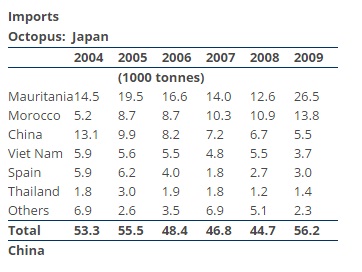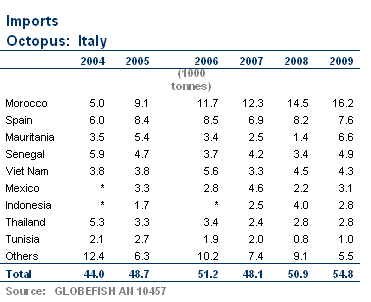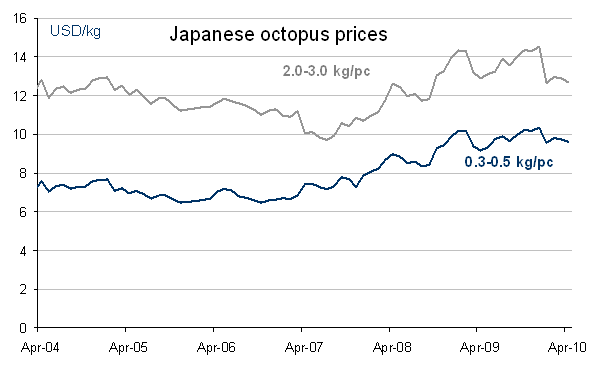Octopus - May 2010
.jpg)
The octopus season off West Africa is still underway and likely to continue through April, but catches are lower than expected, and the sizes caught are not easy to sell.
Abundant octopus supply snapped up by high demand in 2009
The octopus season off West Africa is still underway and likely to continue through April, but catches are lower than expected, and the sizes caught are not easy to sell. The late start of the biological rest period will mean fewer octopus products will reach the market during summer months, which probably will result in better prices towards the middle of the year.
In order to counterbalance the difficult economic situation last year, Mauritanian authorities allowed extremely high octopus catches. This production flooded the market, and prices of octopus declined sharply. As a result imports into the main markets were high, owing to Mauritanian octopus. This country doubled its exports to Japan (26 500 tonnes) and to Spain (9 200 tonnes), while Italy reported octopus imports four times higher than previously from Mauritania (6 000 tonnes). Prices of Mauritanian octopus reached a high of USD 14.50/kg in December 2009 in the Japanese market, but since then have declined, to the present level of USD 12.70/kg.
Japanese octopus imports increased significantly in 2009, especially during the last quarter of the year, which saw a 100% growth over the same period of 2008. Japanese traders took advantage of good supply, but because of the excellent demand, coldstorage holdings moved quickly. In the whole of 2009, 56 200 tonnes of octopus were imported into Japan, 25% more than in 2008. As already mentioned, Mauritania doubled exports and made up for more than 40% of total octopus imports. Morocco is the number two exporter of octopus to the Japanese market. Good octopus catches in 2009 resulted in a 30% increase in shipments to Japan.

Italy is the world’s second major importer of octopus with 55 000 tonnes. This represents an 8% increase compared with the previous year. Morocco, the main supplier to this market, increased its shipments by 10%.

Spanish octopus imports increased slightly to 43 300 tonnes, despite the difficult economic situation in the country. This was mainly the result of increased supply from Mauritania. Morocco, traditionally the main trading partner for octopus with Spain, diverted some quantities to more attractive markets such as Japan and Italy, who were willing to pay higher prices.

Octopus prices are likely to decline for a further two months, but during the biological fishing ban, prices should go up somewhat. Future developments during the course of the year will depend on the fishing quota set by Moroccan authorities and by the interest of the Mauritanian government in enforcing measures to protect the resource.

Report prepared by Helga Josupeit (FAO)

